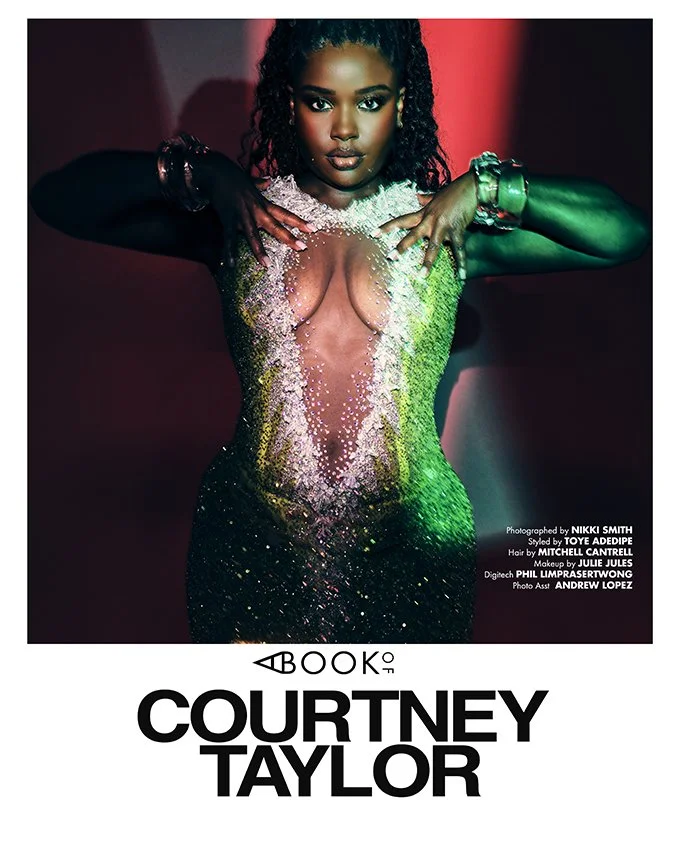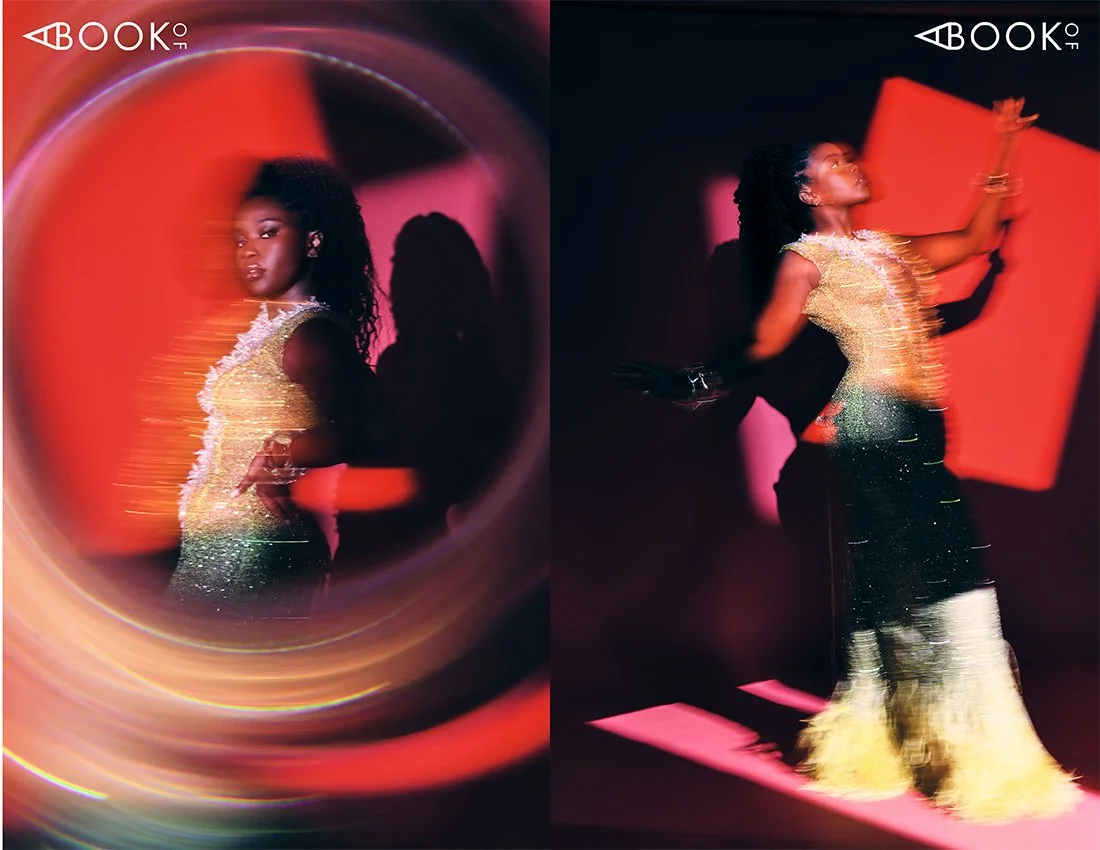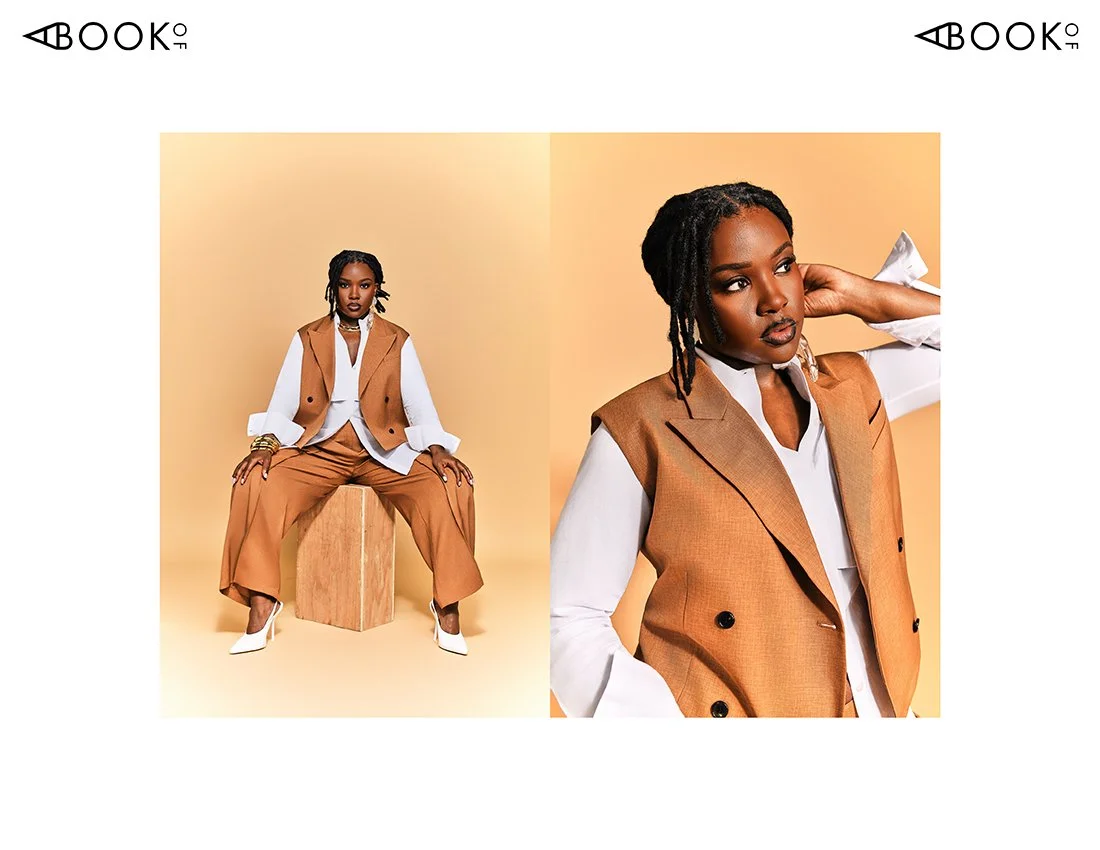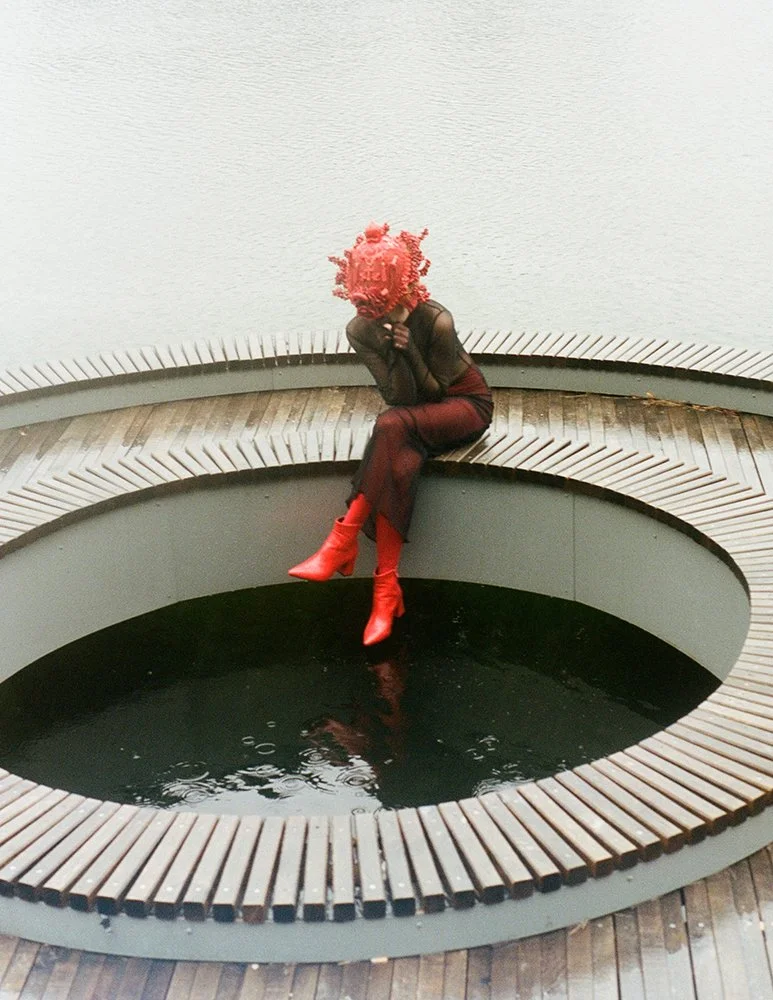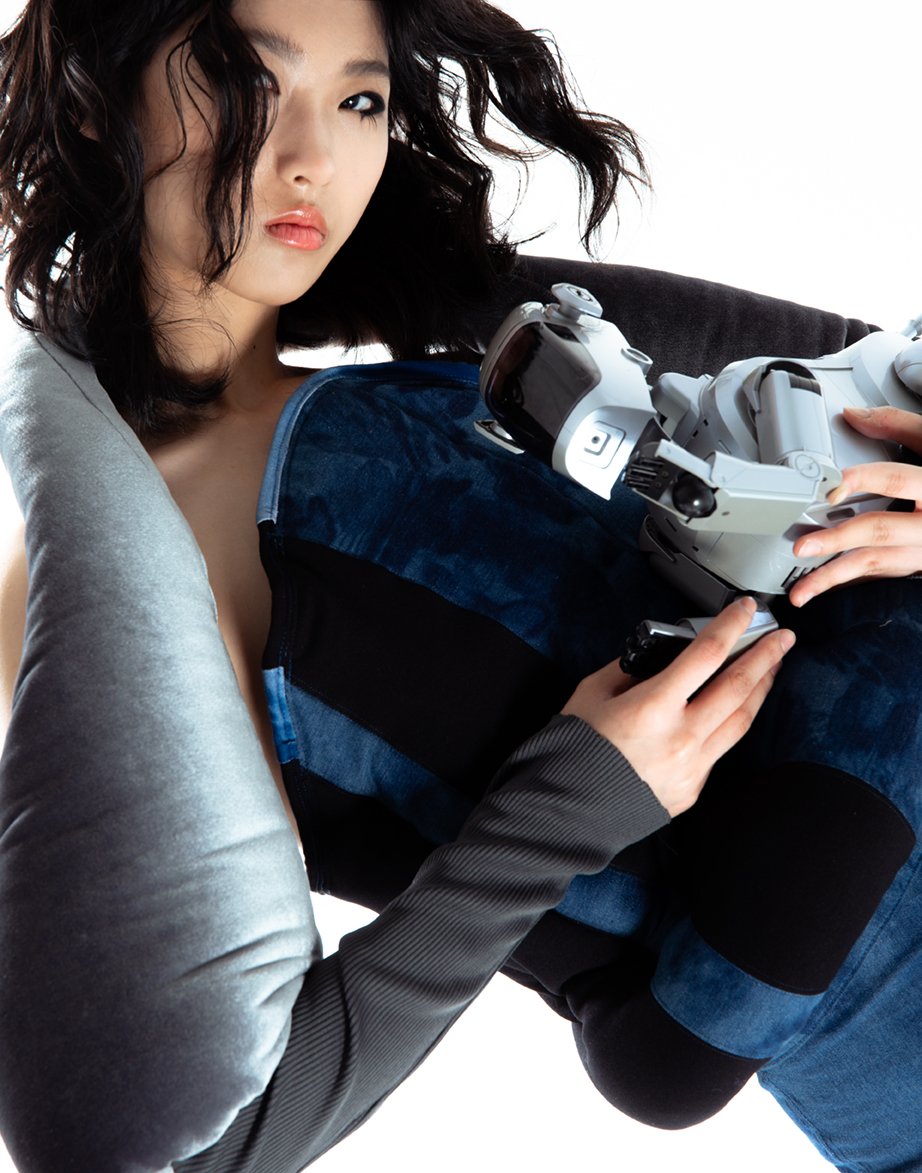BOOK THE ROOM: COURTNEY TAYLOR’S RISE
BY IRVIN RIVERA
PHOTOGRAPHER: IRVIN RIVERA, FASHION STYLING: TOYE ADEDIPE, MAKEUP ARTIST: JULIE JULES, HAIR STYLIST: MITCHELL CANTRELL, DIGITECH: PHIL LIMPRASERTWONG, PHOTO ASST: ANDREW LOPEZ
COURTNEY TAYLOR steals each scene like a heartbeat, she is precise, quick-footed, and quietly commanding, bringing Philly grit and Letterboxd-fueled curiosity to Zamira Parker, the ex-detective at the center of Ballard, a brisk Los Angeles cold-case drama led by Maggie Q and populated by seasoned pros like John Carroll Lynch and Michael Mosley. On set, she’s the actor who paces herself into a moment as she literally steps away to rehearse in private, then returns with a vulnerability honed for punch-ups and pulse-quickening interrogations; you feel her training in every clipped look, every softened fist.
She’s learned to marry procedure with feeling, and that’s leaning on consultants for authenticity, an acting coach for the deeper cracks, and her own stubborn discipline to keep the stakes human when the cameras roll. Whether she’s grounding a scene with mindful breathing, lifting others by championing equal-opportunity stories, or daring to play the villain next, Taylor shows up ready to do the work and to remind the room that momentum matters: “You are being talked about in rooms that you have not entered.”
Hi Courtney, how are you? Thank you for your time and the wonderful shoot. What’s been inspiring you lately?
Hey! I'm so good, thank you for asking, and thank you for having me! What's been inspiring me lately has been watching some of my favorite top 4 films. I started following Letterboxd recently, and getting to sit down and watch some of these icons' favorites has been a real treat. It's also a super fun journey in general to see what people like and watch films I don't think I could have found on my own.
Let’s delve into your story. You first popped up in small-camera roles before landing bigger parts. Looking back, what early memory of performing (whether school plays, community events or your very first audition) made you realize acting could be your life’s work?
I would say it had to have been my first big audition that made me realize this is something I NEED to do. I had gotten an audition early on in my career for "Unknown Marvel" project, and I was so excited to be receiving something so big! I most definitely don't feel I was at the level I needed to be for this audition, but I took a big swing and just believed I was supposed to be in the room. I had walked down the stairs from the audition and got a call from my agent immediately, saying they wanted me to come back for a callback. I was floored. I couldn't believe I had done THAT well. I was so floored that I overthought the callback and bombed the second audition. But, when I left the room the second time, I was still so excited, because I was like "imagine what I will be capable of if I get really serious about this?" And the rest was history.
Growing up in your hometown, which brimmed with local art, how did that community shape the authenticity and grit you bring to every character?
Since I grew up in Delaware pretty early on in my life - I was born in Philly, moved from Philly when I was 9 - a lot of the community shaping my authenticity was my family. My mom and dad were born and raised there, and we also spent almost every other weekend going to Philly, so it was me spending so much time with all of them that allowed me to never lose my roots. They have always been so active in my life, and never let me forget where I come from, which instilled in me my Philly pride I have today!
Portraying Erika on Abbott Elementary, you balanced comic timing with heartfelt depth. How did stepping into a school environment change the way you think about ensemble storytelling and giving space to every character’s humanity?
Ensemble storytelling is so prevalent in the show, the only thing the environment did was capitalize on the fun opportunities to lean on the kids and stand out recurring characters. We, as audience members, get to evolve with the show and grow with the lead characters as we hear more from each new standout person in the episodes! Evolving and growing is the largest human experience we share, so seeing it be portrayed so beautifully in the show,as we follow not only their careers as teachers but their relationships with one another, only expanded my knowledge of how storytelling can be done.
Your work on Neon and Out of My Mind explored everything from reggaeton beats to powerful messages of equal opportunity in education. How has leading in projects across Netflix, Disney+, and Sundance-premiering films expanded your own sense of artistic possibility?
It showed me that I can be all these characters and more! We tend to put ourselves in a box as to "what makes sense for us to portray,y" and I got tired of doing that. When I saw these ambitious roles pop up in my inbox, a loud part of my brain was saying that it would be difficult to mold myself into them. "I don't know if I'm really like these women." The whole time, the quieter part of my brain kept saying, "Who said you aren't?" Artistic possibility is endless after you silence that loud, doubtful voice in the back of your head that thinks it knows everything. You are exactly who you think you are, so why not think the best of yourself?
Joining Maggie Q and the Bosch universe as Zamira Parker meant returning to law-enforcement drama with new stakes. How did you prepare to portray a detective who’s left the force and must balance her impulse for justice with the emotional scars of her past?
It was a lot of me leaning on the consultants we had on set to get me in the headspace of the detective. Mitzi was such an amazing source; she had so much experience not only as a woman in the force but as a POC as well. Her stories made for great research, especially since she was always so passionate about her work, even when it was tough to be in the force at times.
On set in Los Angeles’s cold-case unit, you shared scenes with John Carroll Lynch, Michael Mosley, and other veterans. What unexpected lesson did you learn about leadership or trust while bringing Zamira’s fierce loyalty to life?
I learned that leadership is a lot of giving your best to the people around you. John, Michael, Maggie especially, never stopped giving their all on set. Not just when it came to showing up for their castmates, but the crew as well. They were always taking care of everyone on set, providing good energy, and it's just a beautiful reminder that you every single person matters and that we have to take care of each other to make great work.
Ballard blends fast-paced procedural work with quiet character moments. How did you find the rhythm between shootouts and soul-searching, ensuring Zamira’s vulnerability landed as powerfully as her punch-ups?
What helped me a lot was getting an acting coach involved. Some scenes came pretty easily to me, as they were pretty self-explanatory, but some of my more serious moments, I knew I needed an extra set of hands - someone to help me really open up like I really wanted to. It was difficult for me to allow myself to be that vulnerable, because I have a hard time doing it for myself, but I knew Zamira needed that, so I leaned in as much as possible. I took myself out of my comfort zone to give my character everything she needed.
You’ve spoken about equal-opportunity themes in Out of My Mind and encouraged emerging creators on Instagram. How do you see your platform as a way to champion underrepresented voices both on and off camera?
With a platform as large (somewhat) as mine, championing my generation and beyond almost feels like a duty at this point. I try to remind people every day to create and lean on their platforms as a means to creating what they want to see. When I'm not in front of the camera, I try to hold my people within my community accountable for the stories they want to create, setting up times to write, helping with auditions, reminding them they have people in their lives they can create with, and how important it is for all of us to create the creative future we want to see.
Between takes on intense drama sets, you’ve shared quick rituals: mindful breathing, journaling or a favorite song. What practice do you rely on most to reset your mind and stay present?
During the more dramatic moments, I spent a lot of time pacing by myself. I would go to a more secluded part of the set and would pace back and forth from one end to another: staying in the scene as much as possible and preparing myself for the work. It did feel like it grounded me in those moments by keeping me focused on where I was and what the scene needed out of me. It was so helpful and pretty soothing.
Your characters often fight systems. How has your commitment to social causes (education access, mental-health awareness, etc.) influenced the roles you choose and the stories you want to tell?
The roles actors choose also tell a story of the person they would like to be perceived as. I aim to audition for roles that allow me to tackle tough issues and bring it to light as much as possible. Yes, a good amount of my roles are quite light, but I've been so lucky to have the opportunity to focus my energy on roles that have a message behind it.
Looking back on close calls, callbacks, and those days you thought you might quit, what single lesson from your journey keeps you grounded when the industry feels uncertain?
You are being talked about in rooms that you have not entered. Favorite lesson I've learned in this industry which is why my first priority is to book the room.
As Ballard’s first season wraps and new projects call your name, what kinds of stories are you most eager to explore next, whether in comedy, thriller, or something entirely new?
I am impatiently waiting to be the villain in an upcoming project. How amazing would that be?
Finally, if you were a book, what book would you be and why?
All About Love by Bell Hooks because it has shown me how I actively want to show up in relationships, friendships, and in life.


